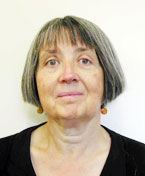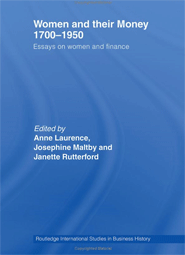200 years of women’s financial influence
Posted on 15 January 2009

The role of women as investors and managers of their finances is the focus of research by Professor Josephine Maltby in The York Management School.
Control of money and how it is invested is popularly considered to have been almost universally a male preserve until relatively recent times. Professor Maltby is co-editor (with Professors Anne Laurence and Janette Rutterford, both of the Open University) of a new book, Women and their money c.1700-c.1950: Essays on women and finance (Routledge) which offers a challenge to this assumption.
They note that historians working in social and economic history and in women’s and gender history usually discuss the economics of women’s lives in terms on the one hand of poverty, powerlessness and absence of money and on the other of waged and unwaged work.
In contrast, the research of the editors and contributors to the book shows women were running bank accounts and were active investors as far back as the early 18th Century, so that, for instance, in 1723 as many as 20 per cent of the investors in the South Sea Company were women.
This reflects the reality facing widows, spinsters and other women who had to rely on income from their investments to support themselves in the absence of significant opportunities to earn a living.
In an essay for the book, Professors Maltby and Rutterford examine how women’s financial affairs were represented in 19th-century literature. Contrary to the widely held view that novels portrayed women of the day as housekeepers detached from capitalism, they found plenty of evidence in the work of Trollope and others of the role taken by women in financial matters and the relationship between money and marriage. Indeed, books of the period reveal a great deal of anxiety and debate about the extent of women’s financial activity.
Separate research, recently completed, into women investors in England and Wales between 1870 and 1930, shows that even at the start of the period 15 per cent of shareholders were women, rising to 42 per cent in 1935. In some companies with household names, such as Boots, and Lyons, women formed the majority of shareholders by the end of this period. Where women owned shares, those investments represented between 28 per cent and 32 per cent of the value of their estates.
The project on women investors in England and Wales between 1870 and 1930 and funded by the Economic and Social Research Council, was a collaboration between Professor Maltby, Professor Rutterford, Dr David Green of King’s College, London, and Dr Alastair Owens of Queen Mary University of London.
About the researcher

Professor Josephine Maltby is a Professor of Accounting and Finance in the York Management School
Contact
Email: jm564@york.ac.uk.
Further information
Buy the book
Buy Women and Their Money 1700-1950: Essays on women and finance (Amazon.co.uk)

